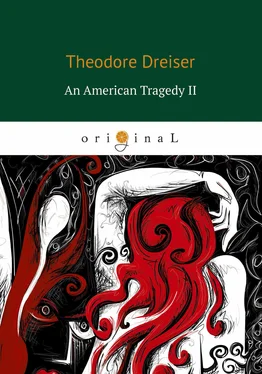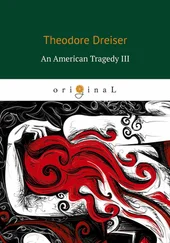Теодор Драйзер - An American Tragedy II
Здесь есть возможность читать онлайн «Теодор Драйзер - An American Tragedy II» — ознакомительный отрывок электронной книги совершенно бесплатно, а после прочтения отрывка купить полную версию. В некоторых случаях можно слушать аудио, скачать через торрент в формате fb2 и присутствует краткое содержание. Город: Москва, Год выпуска: 2018, ISBN: 2018, Жанр: foreign_prose, literature_20, на английском языке. Описание произведения, (предисловие) а так же отзывы посетителей доступны на портале библиотеки ЛибКат.
- Название:An American Tragedy II
- Автор:
- Жанр:
- Год:2018
- Город:Москва
- ISBN:978-5-521-06864-7
- Рейтинг книги:3 / 5. Голосов: 1
-
Избранное:Добавить в избранное
- Отзывы:
-
Ваша оценка:
- 60
- 1
- 2
- 3
- 4
- 5
An American Tragedy II: краткое содержание, описание и аннотация
Предлагаем к чтению аннотацию, описание, краткое содержание или предисловие (зависит от того, что написал сам автор книги «An American Tragedy II»). Если вы не нашли необходимую информацию о книге — напишите в комментариях, мы постараемся отыскать её.
An American Tragedy II — читать онлайн ознакомительный отрывок
Ниже представлен текст книги, разбитый по страницам. Система сохранения места последней прочитанной страницы, позволяет с удобством читать онлайн бесплатно книгу «An American Tragedy II», без необходимости каждый раз заново искать на чём Вы остановились. Поставьте закладку, и сможете в любой момент перейти на страницу, на которой закончили чтение.
Интервал:
Закладка:
Theodore Dreiser
An American Tragedy II
© T8RUGRAM, 2018
© Original, 2018
Chapter 1
The home of Samuel Griffiths in Lycurgus, New York, a city of some twenty-five thousand inhabitants midway between Utica and Albany. Near the dinner hour and by degrees the family assembling for its customary meal. On this occasion the preparations were of a more elaborate nature than usual, owing to the fact that for the past four days Mr. Samuel Griffiths, the husband and father, had been absent attending a conference of shirt and collar manufacturers in Chicago, price-cutting by upstart rivals in the west having necessitated compromise and adjustment by those who manufactured in the east. He was but now returned and had telephoned earlier in the afternoon that he had arrived, and was going to his office in the factory where he would remain until dinner time.
Being long accustomed to the ways of a practical and convinced man who believed in himself and considered his judgment and his decision sound – almost final – for the most part, anyhow, Mrs. Griffiths thought nothing of this. He would appear and greet her in due order.
Knowing that he preferred leg of lamb above many other things, after due word with Mrs. Truesdale, her homely but useful housekeeper, she ordered lamb. And the appropriate vegetables and dessert having been decided upon, she gave herself over to thoughts of her eldest daughter Myra, who, having graduated from Smith College several years before, was still unmarried. And the reason for this, as Mrs. Griffiths well understood, though she was never quite willing to admit it openly, was that Myra was not very good looking. Her nose was too long, her eyes too close-set, her chin not sufficiently rounded to give her a girlish and pleasing appearance. For the most part she seemed too thoughtful and studious – as a rule not interested in the ordinary social life of that city. Neither did she possess that savoir faire, let alone that peculiar appeal for men, that characterized some girls even when they were not pretty. As her mother saw it, she was really too critical and too intellectual, having a mind that was rather above the world in which she found herself.
Brought up amid comparative luxury, without having to worry about any of the rough details of making a living, she had been confronted, nevertheless, by the difficulties of making her own way in the matter of social favor and love – two objectives which, without beauty or charm, were about as difficult as the attaining to extreme wealth by a beggar. And the fact that for twelve years now – ever since she had been fourteen – she had seen the lives of other youths and maidens in this small world in which she moved passing gayly enough, while hers was more or less confined to reading, music, the business of keeping as neatly and attractively arrayed as possible, and of going to visit friends in the hope of possibly encountering somewhere, somehow, the one temperament who would be interested in her, had saddened, if not exactly soured her. And that despite the fact that the material comfort of her parents and herself was exceptional.
Just now she had gone through her mother’s room to her own, looking as though she were not very much interested in anything. Her mother had been trying to think of something to suggest that would take her out of herself, when the younger daughter, Bella, fresh from a passing visit to the home of the Finchleys, wealthy neighbors where she had stopped on her way from the Snedeker School, burst in upon her.
Contrasted with her sister, who was tall and dark and rather sallow, Bella, though shorter, was far more gracefully and vigorously formed. She had thick brown – almost black – hair, a brown and olive complexion tinted with red, and eyes brown and genial, that blazed with an eager, seeking light. In addition to her sound and lithe physique, she possessed vitality and animation. Her arms and legs were graceful and active. Plainly she was given to liking things as she found them – enjoying life as it was – and hence, unlike her sister, she was unusually attractive to men and boys – to men and women, old and young – a fact which her mother and father well knew. No danger of any lack of marriage offers for her when the time came. As her mother saw it, too many youths and men were already buzzing around, and so posing the question of a proper husband for her. Already she had displayed a tendency to become thick and fast friends, not only with the scions of the older and more conservative families who constituted the ultra-respectable element of the city, but also, and this was more to her mother’s distaste, with the sons and daughters of some of those later and hence socially less important families of the region – the sons and daughters of manufacturers of bacon, canning jars, vacuum cleaners, wooden and wicker ware, and typewriters, who constituted a solid enough financial element in the city, but who made up what might be considered the “fast set” in the local life.
In Mrs. Griffiths’ opinion, there was too much dancing, cabareting, automobiling to one city and another, without due social supervision. Yet, as a contrast to her sister, Myra, what a relief. It was only from the point of view of proper surveillance, or until she was safely and religiously married, that Mrs. Griffiths troubled or even objected to most of her present contacts and yearnings and gayeties. She desired to protect her.
“Now, where have you been?” she demanded, as her daughter burst into the room, throwing down her books and drawing near to the open fire that burned there.
“Just think, Mamma,” began Bella most unconcernedly and almost irrelevantly. “The Finchleys are going to give up their place out at Greenwood Lake this coming summer and go up to Twelfth Lake near Pine Point. They’re going to build a new bungalow up there. And Sondra says that this time it’s going to be right down at the water’s edge – not away from it, as it is out here. And they’re going to have a great big verandah with a hardwood floor. And a boathouse big enough for a thirty-foot electric launch that Mr. Finchley is going to buy for Stuart. Won’t that be wonderful? And she says that if you will let me, that I can come up there for all summer long, or for as long as I like. And Gil, too, if he will. It’s just across the lake from the Emery Lodge, you know, and the East Gate Hotel. And the Phants’ place, you know, the Phants of Utica, is just below theirs near Sharon. Isn’t that just wonderful? Won’t that be great? I wish you and Dad would make up your minds to build up there now sometime, Mamma. It looks to me now as though nearly everybody that’s worth anything down here is moving up there.”
She talked so fast and swung about so, looking now at the open fire burning in the grate, then out of the two high windows that commanded the front lawn and a full view of Wykeagy Avenue, lit by the electric lights in the winter dusk, that her mother had no opportunity to insert any comment until this was over. However, she managed to observe: “Yes? Well, what about the Anthonys and the Nicholsons and the Taylors? I haven’t heard of their leaving Greenwood yet.”
“Oh, I know, not the Anthonys or the Nicholsons or the Taylors. Who expects them to move? They’re too old fashioned. They’re not the kind that would move anywhere, are they? No one thinks they are. Just the same Greenwood isn’t like Twelfth Lake. You know that yourself. And all the people that are anybody down on the South Shore are going up there for sure. The Cranstons next year, Sondra says. And after that, I bet the Harriets will go, too.”
“The Cranstons and the Harriets and the Finchleys and Sondra,” commented her mother, half amused and half irritated. “The Cranstons and you and Bertine and Sondra – that’s all I hear these days.” For the Cranstons, and the Finchleys, despite a certain amount of local success in connection with this newer and faster set, were, much more than any of the others, the subject of considerable unfavorable comment. They were the people who, having moved the Cranston Wickwire Company from Albany, and the Finchley Electric Sweeper from Buffalo, and built large factories on the south bank of the Mohawk River, to say nothing of new and grandiose houses in Wykeagy Avenue and summer cottages at Greenwood, some twenty miles northwest, were setting a rather showy, and hence disagreeable, pace to all of the wealthy residents of this region. They were given to wearing the smartest clothes, to the latest novelties in cars and entertainments, and constituted a problem to those who with less means considered their position and their equipment about as fixed and interesting and attractive as such things might well be. The Cranstons and the Finchleys were in the main a thorn in the flesh of the remainder of the elite of Lycurgus – too showy and too aggressive.
Читать дальшеИнтервал:
Закладка:
Похожие книги на «An American Tragedy II»
Представляем Вашему вниманию похожие книги на «An American Tragedy II» списком для выбора. Мы отобрали схожую по названию и смыслу литературу в надежде предоставить читателям больше вариантов отыскать новые, интересные, ещё непрочитанные произведения.
Обсуждение, отзывы о книге «An American Tragedy II» и просто собственные мнения читателей. Оставьте ваши комментарии, напишите, что Вы думаете о произведении, его смысле или главных героях. Укажите что конкретно понравилось, а что нет, и почему Вы так считаете.









